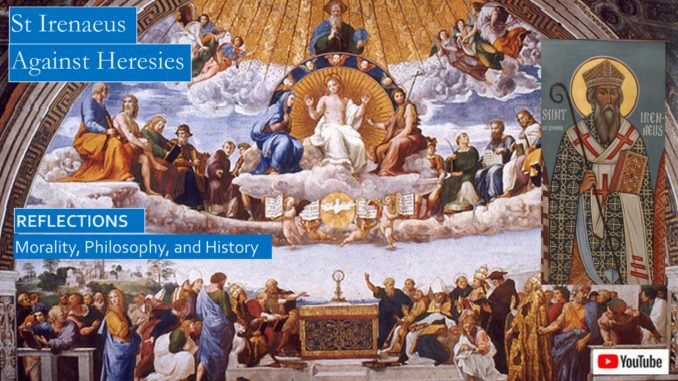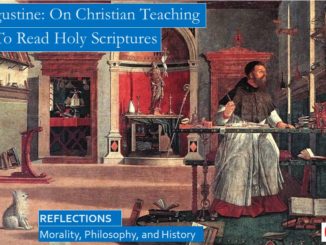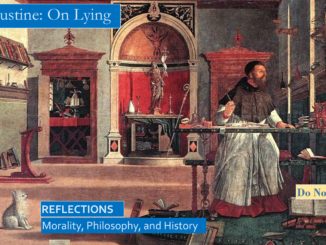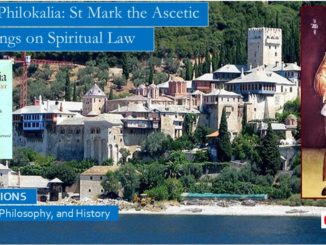
In his preface St Irenaeus warns us the error of heresy often “is attractively decked out in an attractive dress, so it appears to the ignorant to be more true than truth itself.”[1] The Gnostics want to deny the saving powers of the Incarnation and Resurrection of Jesus.
St Irenaeus Blog 1 http://www.seekingvirtueandwisdom.com/st-irenaeus-blog-1-against-heresies-introduction/
St Irenaeus elegantly summarizes his refutation of Gnosticism, “If Christ was not born, neither did He die. If Christ did not die, neither did He rise from the dead. If He did not rise from the dead, He did not conquer death and abolish its reign. If Christ did not conquer death, how are we to ascend to the light, we who from the beginning have been subject to death? Those who rob man of redemption do not believe that God will raise man from the dead.”[2]
The best place to purchase the eBook version of the Ante-Nicene Fathers, Volume 1, is http://www.christianbook.com
Heresies did not die with Irenaeus, Christians today face modern heresies that are merely twists on the ancient Gnostic heresies. Jehovah’s witnesses, whose scriptures, like Marcion’s Scriptures are edited to conform to their theology, denying the reality of the Trinity. The Mormon religion, like Islam denying the primary authority of Scripture, claims that the Bible has been corrupted, and that the Book of Mormon is the true revelation, weaving a very gnostic universe where each believer can become the god of his own world in another galaxy. This is not new, Irenaeus says that the Gnostics used similar tactics, “When Scripture is used to demolish their arguments, the heretics turn around and start accusing Scripture itself: they say it is inaccurate and untrustworthy.”[3]
Today there are Gnostic systems that aim to totally replace Christianity. One example is Wicca, which claims to worship the ancient mother goddess in Wicca, but which is really a cobbling together of new age stuff from the fifties.[4]
LOVE IS THE WAY TO GOD
St Irenaeus teaches that love is the way to God. “St Paul says that without Love for God, there is no value in knowledge, nor in the understanding of mysteries, nor in faith, nor in prophecy. They are all hollow and in vain without love. It is love that makes man perfect, and he who Loves God is perfect in this world and in the world to come. We should never cease to Love God, the more we behold God, the move we shall Love God.”[5]
Faith and Love go together for St Irenaeus. “Faith in our Master will remain ever firm, assuring us that there is only one true God, ant that we should Love Him forever, for He alone is our Father, and that we should hope to receive and learn more and more from God, because He is good, and possesses boundless riches, a kingdom without end, and knowledge beyond measure.”[6]
In this section on forgiveness, St Irenaeus teaches us that it is folly to try to separate Jesus the Son of God from Jesus the moral teacher, Jesus the Son of Man. “In forgiving sins, the Lord not only healed man, He also showed clearly who He was. If no one can forgive sins but God alone, and if the Lord did forgive them and did heal men, it is plain that He was Himself the Word of God made the Son of Man.”[7]
St Irenaeus comments on several issues that continue to be debated up to the present day. St Irenaeus contrasts Christians and heretics; Christians believe that good works are necessary for the saved, but heretics say that they are “saved, not by their conduct, but because they are spiritual in nature.”[8] Also, a passing comment indicates the early church practiced infant baptism.[9] St Irenaeus warns against “inquiring about God using numbers, syllables and letters.”[10]
If good and evil did not both exist, and if what men considered to be righteous and unrighteousness were only their opinion, “God would have never taught, ‘The righteous shall shine forth as the sun in the kingdom of their Father,’ but He shall send the unrighteous ‘into everlasting fire, where their worm shall not die, and the fire will not be quenched.’ “[11]
PLATO AND REINCARNATION
Plato, in his dialogue Timaeus, speculates about transmigration, or reincarnation. He has some of the Greek heroes of Troy choose to become eagles or other beasts of prey, and he has Odysseus choose to be a simple farmer so he can lead a simple, quiet life. St Irenaeus has two main objections to this doctrine, the first is that it conflicts with early Christian teaching about the physical resurrection of the body. The second is the Platonic notion that there is no creation, that the world has no beginning and will never end, a belief that fits in well with the notion of reincarnation. The early Christian belief is that God created the world ex nihilo, from nothing.
Irenaeus questions if we were reincarnated, why we do not remember our prior lives. Plato’s explanation for the forgetfulness of the prior life is that the souls must drink from the cup of oblivion before they start their new life, which leads to the question, if Plato drank from the cup of oblivion, how can he remember drinking from the cup of oblivion? Wouldn’t he be oblivious? St Irenaeus asserts that “God is not so poor or destitute that He cannot provide each individual body its own proper soul with its own special character.”[12]
IRENAEUS ON HOLY SCRIPTURE
St Irenaeus warns us that the coming of the Lord would be pointless if Christ “intended to tolerate and preserve each man’s idea regarding God.”[13] St Irenaeus was influential in determining exactly how Christians should view the Old Testament teachings, saying that those Christians are perverse who deceive others by saying the Mosaic laws are contrary to the teachings of the Gospels.[14]
Irenaeus, like St Justin Martyr, teaches that it is Jesus in His pre-incarnate form who speaks to Moses, and he says God in Isaiah 43:10 exhorting that “I too am witness, and the Son whom I have chosen, that you may know, and believe, and understand that I AM.”[15] Modern translations render this “the Servant who I have chosen,” but the early Church Fathers understand this verse to refer to the Son of God.[16]
St Irenaeus, meeting the challenge of Marcion, teaches that the “Gospels are four in number, neither more nor less.” He begins his argument by quoting John 1, showing that the early Church Fathers have no doubt about the authenticity of the spiritual Gospel, “In the beginning was the Word, and the Word was with God, and the Word was God. The same was in the beginning with God. All things were made by Him, and without Him was nothing made. What was made was life in Him, and without Him was nothing made. What was made was life in Him, and the life was the light of men. And the light shines in the darkness, and the darkness did not comprehend it.”
St Irenaeus was using the same imperfect Latin translation that helped prevent the earlier conversion of St Augustine, this was before the days of St Jerome and his Latin Vulgate translation. The modern translation differs, and I left in the footnote showing there was a judgement call made on this translation: “In the beginning was the Word, and the Word was with God, and the Word was God. He was in the beginning with God. All things came into being through him, and without him not one thing came into being. What has come into being in him was life,[a] and the life was the light of all people. The light shines in the darkness, and the darkness did not overcome it.”[17]
Scholars likely regret that St Irenaeus would explain why other gospels were excluded, but this indirectly confirms that there was not a strong fifth gospel in wide circulation in the Early Church. He provides mystical reasons, just as there are four Gospels there are four zones of the world, the four principal winds, the four-faced cherubim, and the four covenants. The early Church Fathers search for types of Christ in the Old Testament. For the four-faced cherubim of Ezekiel, the lion represents the royal power of God, the calf the “sacrificial and sacerdotal order,” the face of a man shows that Jesus took on flesh, and the fourth eagle face is the “gift of the Spirit hovering with His wings over the Church.” The four covenants are the covenants with Adam, Noah, Moses and Christ in the Latin translation, and Abraham, Noah, Moses and Christ in the Greek translation.[18]
St Irenaeus and the early Church Fathers view the Greek Old Testament as scripture, which renders Isaiah 7:14 as, “the Lord Himself shall give you a sign; Behold, a virgin shall conceive and bear a son, and you shall call his name Emmanuel.” He is aware that the Masoretic Hebrew text differs, he accuses the Jews of altering the text to read, “a young woman shall conceive and bear a son.” St Irenaeus argues that a virgin giving birth would be truly a sign, but that young women give birth all the time, so that would not be an impressive sign.[19]
Additional introduction: http://www.seekingvirtueandwisdom.com/st-irenaeus-on-heresies-eusebius-and-modern-scholars-and-catholic-catechism/
St Irenaeus Blog 3 http://www.seekingvirtueandwisdom.com/st-irenaeus-blog-3-allegorical-interpretations-of-scripture/
[1] Irenaeus, “Irenaeus Against Heresies,” in the Nicene and Post-Nicene Fathers, First Series, Volume 1 (Boston: Hendrickson Publishers, 1994, first published 1885), Book 1, Chapter 1, p. 315.
[2] Irenaeus, “Demonstration of the Apostolic Preaching,” in “The Scandal of the Incarnation,” translated by John Saward (San Francisco, Ignatius Press, 1990), Chapter 39, p. 15.
[3] Irenaeus, “Irenaeus Against Heresies,” in “The Scandal of the Incarnation,” Chapter 2, Book 1, p. 79.
[4] https://www.theatlantic.com/magazine/archive/2001/01/the-scholars-and-the-goddess/305910/
[5] Irenaeus, “Against Heresies,” in “The Scandal of the Incarnation,” Book 4, Chapter 12, pp. 43-44.
[6] Irenaeus, “Against Heresies,” in “The Scandal of the Incarnation,” Book 2, Chapter 28, p. 110.
[7] Irenaeus, “Against Heresies,” in “The Scandal of the Incarnation,” Book 5, Chapter 17, pp. 48.
[8] Irenaeus, “Irenaeus Against Heresies,” Book 1, Chapter 6, p. 324.
[9] Irenaeus, “Irenaeus Against Heresies,” Book 2, Chapter 22.4, footnote 9, p. 391.
[10] Irenaeus, “Irenaeus Against Heresies,” Book 2, Chapter 25, p. 396.
[11] Irenaeus, “Irenaeus Against Heresies,” Book 2, Chapter 32, p. 408.
[12] Irenaeus, “Irenaeus Against Heresies,” Book 2, Chapter 33, pp. 409-411.
[13] Irenaeus, “Irenaeus Against Heresies,” Book 3, Chapter 12.6, p. 432.
[14] Irenaeus, “Irenaeus Against Heresies,” Book 3, Chapter 12.12, p. 434.
[15] Irenaeus, “Irenaeus Against Heresies,” Book 3, Chapter 6, p. 419.
[16] Ancient Christian Commentary, Old Testament, Volume XI (Downer’s Grove, Illinois: Intervarsity Press, 2007), pp. 50-51.
[17] https://www.biblegateway.com/passage/?search=john+1%3A1-5&version=NRSVCE
[18] Irenaeus, “Irenaeus Against Heresies,” Book 3, Chapter 11, pp. 426-429.
[19] Irenaeus, “Irenaeus Against Heresies,” Book 3, Chapter 21, p. 453.




6 Trackbacks / Pingbacks